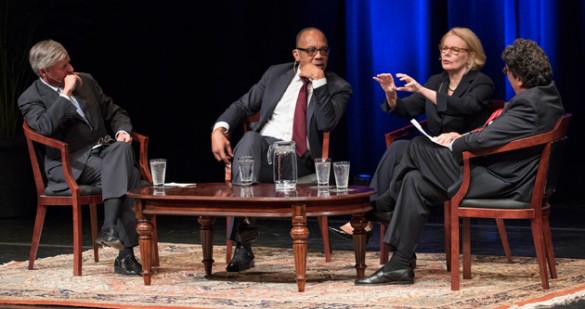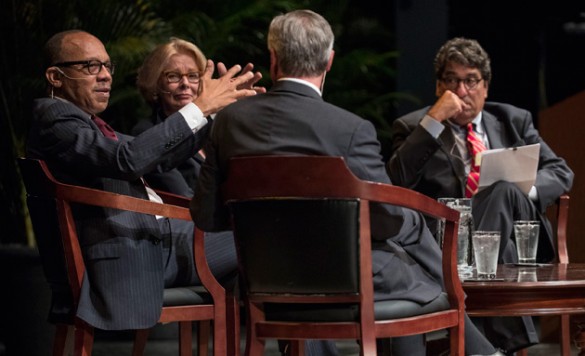Desire for change key to 2016 race, panelists say

In this most unusual election cycle, which at times has teetered “on the edge of absurdity,” the two most unpopular candidates in polling history are vying for the American presidency. How did we get here?
That was the question posed to veteran political journalists Peggy Noonan and Eugene Robinson to kick off the first Chancellor’s Lecture Series event of the 2016-17 academic year. Chancellor Nicholas S. Zeppos hosted the discussion Sept. 14 before a near-capacity crowd in Langford Auditorium, along with Vanderbilt Distinguished Visiting Professor Jon Meacham.
“I can’t help but think that essentially we got here through trauma. … We got here through two un-won wars and a great recession, and what has seemed an insufficient or inadequate recovery,” said Noonan, a longtime columnist for The Wall Street Journal and former speechwriter for President Ronald Reagan. “I think we got here through Washington dysfunction. I think enough frustration had to build—really with both parties—for the emergence of Donald Trump to come.”
Robinson said President Barack Obama’s superior campaigning skills might have created an unintentional vacuum within the Democratic Party’s leadership pipeline.
“You have a Democratic Party that really has been dominated by Barack Obama, who I think is—and I’m going to defend this—the best person to run for president who’s ever run for president in the history of the United States,” said Robinson, a Pulitzer Prize-winning columnist for The Washington Post. “If you’re a black guy, with a name that sounds like it’s from the Guantanamo muster list, middle name ‘Hussein,’ and you get elected president of the United States not once but twice, you are a great campaigner.
“He has dominated the Democratic Party for the last eight years,” Robinson continued. “Meanwhile, all of those up-and-coming Democratic stars who were going to be ready to take the mantle weren’t. They didn’t exist, because Republicans have done so well in the midterm elections that there weren’t those Democratic governors … and Democratic senators who were ready to step in. So the Democratic Party ended up with Hilary Clinton, whose turn it was eight years ago, and that turn got usurped.”

Zeppos asked the panel what a loss for either party would mean for that party’s future. The speakers agreed that the Democratic Party must confront a shift from the political template established by the Clintons in the 1990s—“respecting of business, close to Wall Street, practical in its programmatic liberalism,” according to Noonan—to the progressivism represented by Bernie Sanders in his impressive but ultimately unsuccessful run for the presidency.
“The Democratic Party needs a thinking Republican Party as an intellectual challenge,” Robinson noted, “because the Democratic Party is running on ideas and programs and policies that have been around for a while now, and they don’t reflect a fresh, exciting, new look at the problems we face.”
But it’s not only the Democrats who have become “stale” in their ideology—to Trump’s advantage, Noonan said.
“Trump’s stands are at odds with the essential issues and dogma and longtime establishment thinking of the Republican Party,” she said. He has broken with Republicans on trade, entitlements and intervention in foreign wars, with the exception of fighting ISIS.
“If Trump wins the presidency, that will in some sense put the Republican Party in a certain Trumpian direction,” she said, noting that the party currently comprises several disparate constituencies. “If Trump loses, especially if he loses closely, Republican leaders in Washington and in the states are going to have to figure out what the Republican Party stands for. And if they don’t figure it out successfully, then the Republican Party breaks.”
“[rquote]I think it’s fascinating how in many ways, he went over everyone’s heads to the people,” Zeppos said. “You can talk about him being a media star, a television star—but he went right to the people.”[/rquote]
Meacham agreed that Trump’s high profile and populist appeal go hand in hand. “This is almost the apotheosis, the fullest manifestation, of forces that really were unleashed in ’92,” he said. “Perot was almost unimaginable without Larry King, which was that era’s Twitter. … I don’t think Trump would be where he is today without The Apprentice. You use to have celebrity and politics. … Now it’s just all become one thing.”
How would a President Donald Trump govern? Zeppos asked the group.
“Nobody knows. This is a man who has never held a political office—no political office ever,” Noonan said. “I’ve daydreamed over the past few months about what his administration would look like, and the first thought I had was: It will be populated by patriots and opportunists.” Half of Trump’s cabinet appointees would be political newcomers thrilled at the chance to be in the highest echelons of power. The other half would be veterans of previous administrations willing to step in and help govern the country, Noonan theorized.
In many ways, this is an “unpollable” election, she said, noting that in her recent travels, she’s talked to a number of people who have admitted—albeit reluctantly—that they plan to vote for Trump. These “shy Trumpers” are in stark contrast to his more vocal advocates.
“Trump supporters are often described as enraged and angry. I don’t find them enraged and angry. I find them very often to be the only people in politics who are in a good mood right now. They’re pretty raucous, and they’re having a good time,” Noonan said. “But I think they are aware that they’re making a very big gamble. They’re in a mood to say, ‘who we have been backing in the past just hasn’t worked. The country seems to be deteriorating. We have got to try something new and different.’ And if you say anything of Donald Trump, you would say, ‘That’s new and different.’”
The panel agreed that Hillary Clinton currently holds an Electoral College advantage when it comes to the 2016 election, but she’s far from having the race all sewn up. It’s very possible that Trump could win, they said.
“I think people have gotten used to the idea that it can’t happen,” Noonan said. “But of course it can happen. Life is surprise.”